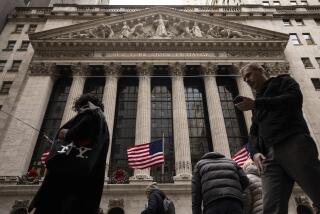Federal Reserve scales back projections of economy’s growth
As the Federal Reserve downgraded its economic projections, Chairman Ben S. Bernanke admitted that the central bank’s board was in the same distressing position as the average American family — frustrated by the slow recovery, limited in its options and largely reduced to hoping for the best.
“I certainly understand that many people are dissatisfied with the state of the economy,” Bernanke told reporters Wednesday when asked about the Occupy Wall Street protests. “I’m dissatisfied with the state of the economy.”
The Fed noted in its official statement after its two-day meeting that economic conditions strengthened somewhat from July through September and that inflation appeared to have slowed.
But the European debt crisis weighed heavily on the U.S. economy as the central bank warned of “significant downside risks to the economic outlook, including strains in global financial markets.”
Given those troubles, the Fed lowered its projections for economic growth and for an improved unemployment rate for the third time this year. The new figures show the recovery slogging along at least through next year.
“In short, while we still expect that economic activity and labor market conditions will improve gradually over time, the pace of progress is likely to be frustratingly slow,” Bernanke said, acknowledging that the Fed had overestimated the strength of the recovery.
Annual growth will be between 1.6% and 1.7% this year, down from the Fed’s June projection of 2.7% to 2.9%. And growth will remain below 3% next year, well below the June forecast of 3.3% to 3.7%.
The unemployment rate — now at 9.1% — also won’t show much improvement. It could remain above 8% through 2013, the Fed said.
And Bernanke noted: “You can see that right now, consumer confidence is about where it was in the depths of the recession. That’s very discouraging.”
Still, the Fed’s policymaking Open Market Committee took no new steps Wednesday to boost the recovery. The central bank appears to be holding its few remaining options in case the European situation worsens or some other new shock hits the economy.
“We’ve already taken quite a bit of action, but we’re prepared to do more, and we have the tools to do more if that’s appropriate,” Bernanke said.
With short-term interest rates likely to remain near zero through mid-2013, however, there’s not a lot left for the Fed to do. After two major rounds of bond buying to try to stimulate the economy, the Fed has taken smaller steps in recent months.
In September, for example, the Fed started shifting more of its portfolio to longer term Treasury bonds in a move to bring down long-term interest rates. The goal was to lower mortgage rates to help improve the housing market.
Some Fed officials have suggested the central bank could buy a large amount of mortgage-backed bonds to lower mortgage rates even more. Bernanke said Wednesday that would be a “viable option” should economic conditions warrant it.
One Fed official — Charles Evans, president of the Federal Reserve Bank of Chicago — believed that the central bank should be doing more. He was the sole member of the 10-person Open Market Committee to vote against the Fed’s action Wednesday because he supported “additional policy accommodation at this time,” according to the central bank’s statement.
But for the time being, the Fed is standing pat and hoping that political leaders in Europe and in Washington take stronger action.
“We are trying to do our best to support economic growth and job creation,” Bernanke said. “I think it would be helpful if we could get assistance from some other parts of the government to work with us to help create more jobs.”
But partisan gridlock has prevented Congress and the White House from taking additional steps to stimulate economic growth.
Meanwhile, a potential default by Greece on its debt loomed over global financial markets. Bernanke said it was “a bit frustrating” waiting on the sidelines for European leaders to address their problems.
“Unfortunately we can’t disassociate ourselves from Europe,” he said. “The things that happen there do affect us.”
The risk of a financial crisis in Europe adds to a string of negative events this year, including Japan’s earthquake and tsunami, that have hampered the U.S. recovery, he said.
“There has been a certain amount of bad luck, and I think the volatility in financial markets associated with the European situation … has been a drag on the recovery,” Bernanke said.
The continued volatility has dampened the confidence of U.S. consumers, Bernanke said. He advised people to try to do the best they can until the economy is stronger.
“My best advice to Americans is to continue to live your lives and continue to think about your personal situation and continue to make smart decisions based on your own financial situation,” he said.







